The Honda Civic and Toyota Corolla are Bitter Rivals. Which One is Better?
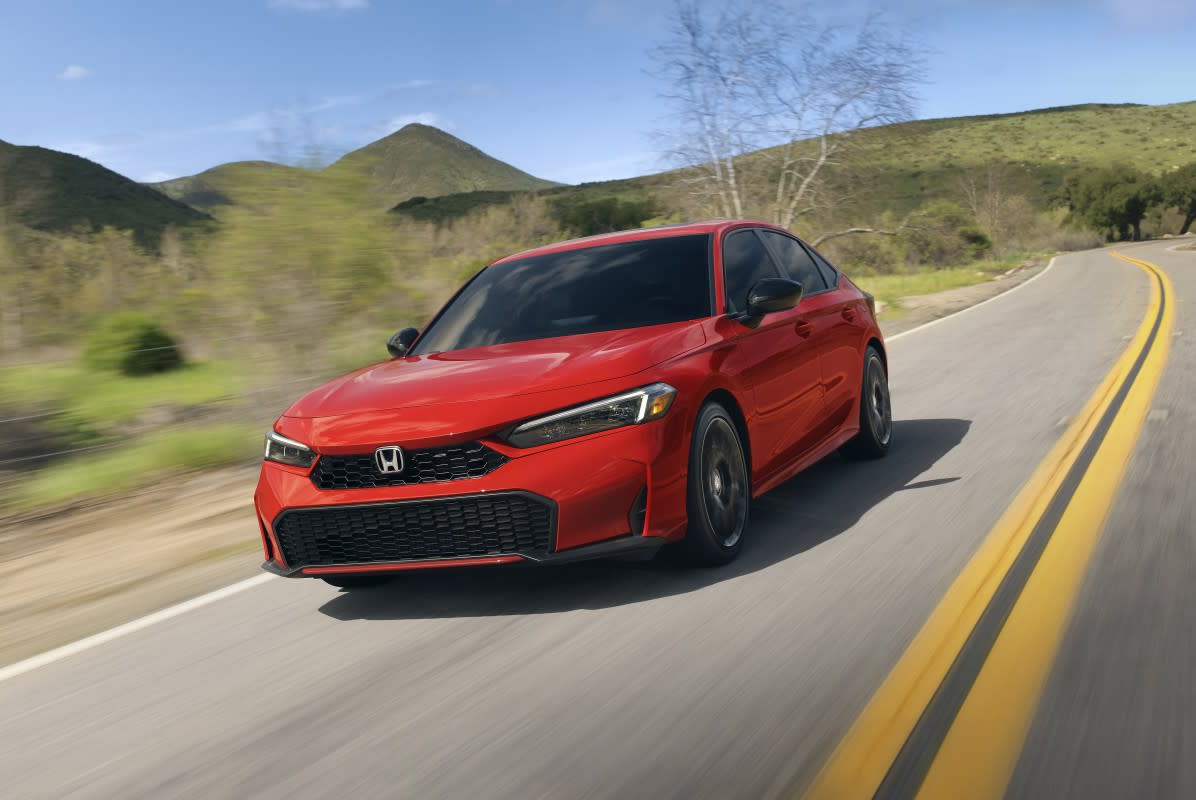
The Honda Civic and Toyota Corolla are Bitter Rivals. Which One is Better? originally appeared on Autoblog.
There aren’t many rivalries in the automotive industry among top sellers that are as fierce or long-lasting as the one between the Honda Civic and the Toyota Corolla. Both the Honda Civic (1973) and the Toyota Corolla (1968) have been for sale in the U.S. longer than most of us have been alive. The two compact cars have undergone tremendous changes over the decades, growing in size, style, and features; they continue to be each other’s fiercest competitors even as more compact cars have entered the fray.
The Civic is now in its 11th generation as of 2021, and it was facelifted last year. The Corolla is a bit longer in the tooth with its 12th generation beginning in 2018. Both cars are practical, fuel-efficient, affordable, and attractive. As with other car models, they receive important improvements that add value, and they each have hybrid variants that make them even more fuel efficient than their gas-only versions already are. But which one is best? To answer that, we’re diving into performance, design, technology, comfort, safety, and value. Here’s how the Civic and Corolla stack up.
Performance and driving dynamics
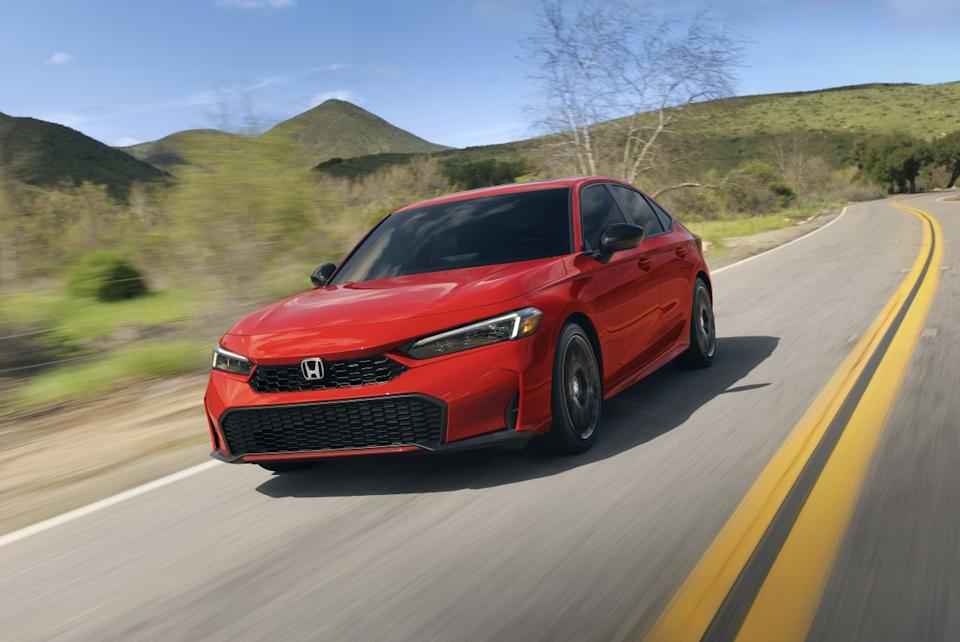 2025 Honda Civic Sedan Sport Touring HybridHonda
2025 Honda Civic Sedan Sport Touring HybridHondaThe 2025 Honda Civic continues to offer one of the most engaging driving experiences in the compact segment, and you don't even have to travel up the trim ladder to enjoy time behind the wheel. The base model comes with a 2.0-liter 4-cylinder engine that makes 158 horsepower, while the upgraded turbocharged 1.5-liter option delivers a healthy 180 horsepower, but even the base LX will bring a smile to your face. The current Civic is known for its responsive steering, composed handling, and a well-tuned suspension that make even the base Civic feel lively on winding roads or just in daily traffic.
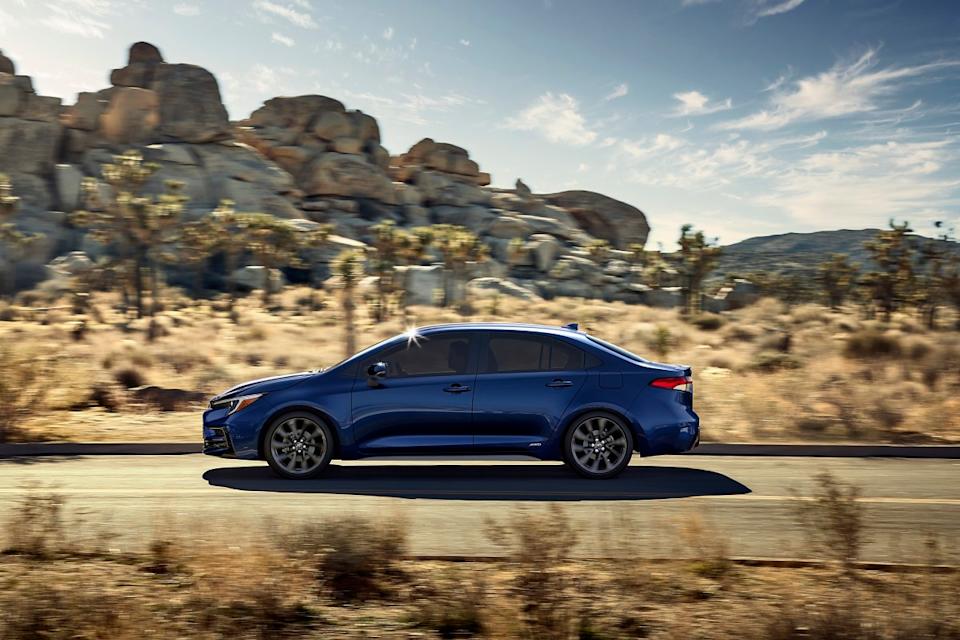 2025 Toyota Corolla HybridToyota
2025 Toyota Corolla HybridToyotaThe 2025 Toyota Corolla, by comparison, is more of a smart commuter and an all-around daily driver. The base 2.0-liter 4-cylinder makes 169 horsepower—slightly more than the Civic’s base engine—but it’s paired with a CVT that emphasizes smoothness over sharpness. While it’s perfectly fine for daily commuting and gets the job done, the Corolla doesn’t deliver the same driver engagement as the Civic.
Winner: Honda Civic
Exterior styling
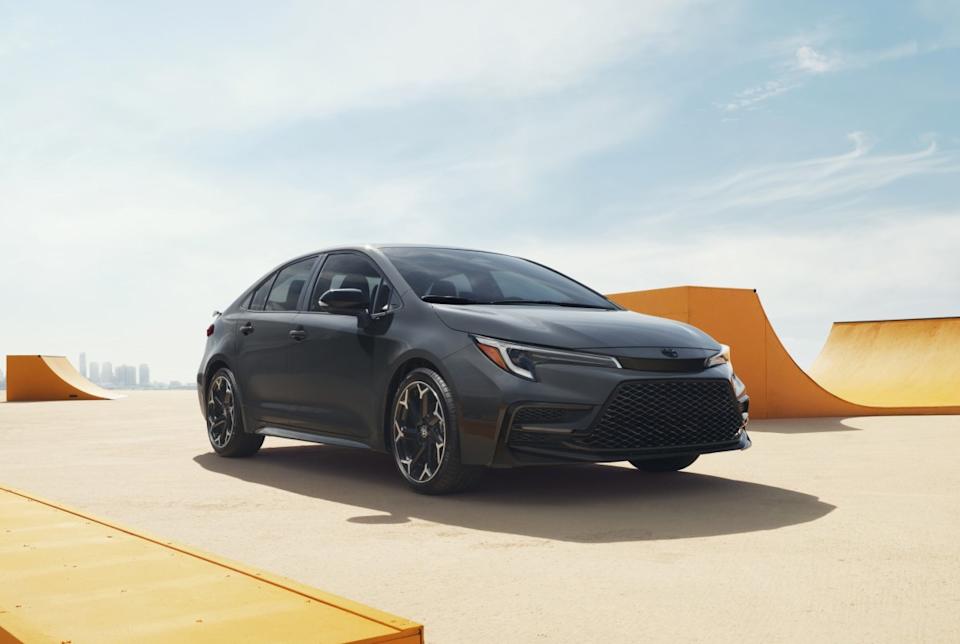 2025 Toyota Corolla FX
2025 Toyota Corolla FXBeauty is in the eye of the beholder, and both the Civic and the Corolla are attractive compact cars. The Corolla is more rounded than the Civic, and lacks the more prominent body creases of the Civic. The front fascia seems less cohesively styled with a pronounced lower grille and busier headlight/DRL clusters. Higher Corolla trims get more dramatically styled, darker wheels than base trims, and the front intakes are noticeably larger and are set deeper. The new FX trim also blacks out trim pieces for an additional dose of style. Overall, the Corolla is more subdued, and the styling seems more dated than the recently facelifted Civic.
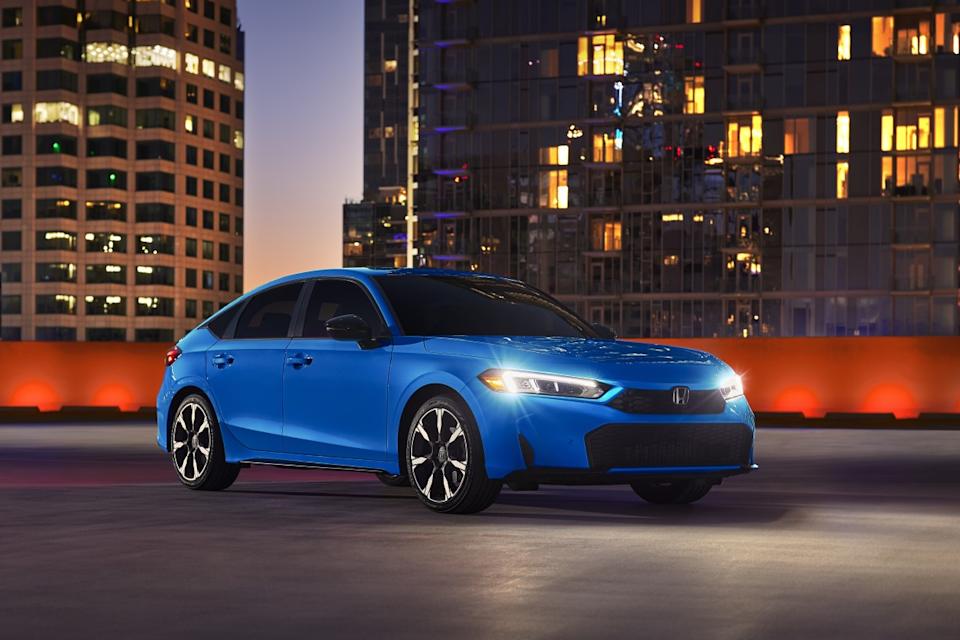 Honda CivicHonda
Honda CivicHonda Unlike the Corolla, the Civic turns heads wherever it goes. It looks great from every angle, and it looks more premium than its affordable price might indicate. It received a refresh for the 2025 model year with subtle changes like a new front bumper and intakes. In both sedan and hatchback (looking like a 5-door sedan), the Civic has great proportions and crisp sheet metal that help it stand out in the compact car segment. We would argue that the looks of the Civic are more cohesive than even its pricier Accord sibling.
Winner: Honda Civic
Interior style and comfort
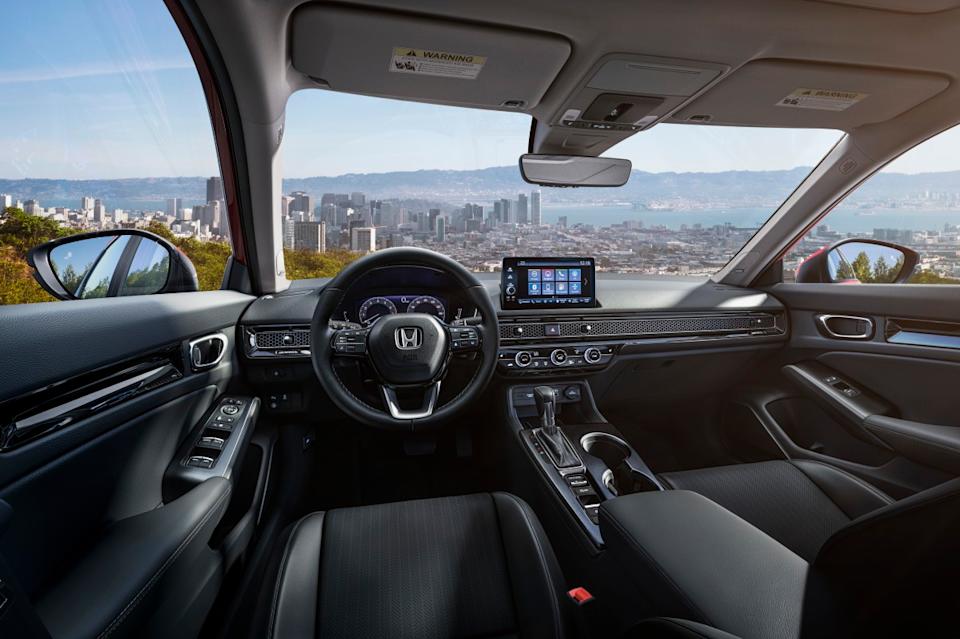 2022 Honda Civic Sedan TouringHonda
2022 Honda Civic Sedan TouringHondaIt's hard to believe how much the cabin of the Civic has improved since the last generation. It's now one of the best interiors in any car at this price. The dash is rife with clean lines, impressive physical controls, high-quality materials, and thoughtful ergonomics that contribute to the driving experience. The honeycomb vents and dash trim draw the eye and add flair in a way that's unexpected. The Civic also has excellent visibility, roomy rear seats (37.4 inches of rear legroom in the sedan), and smartly placed storage throughout.
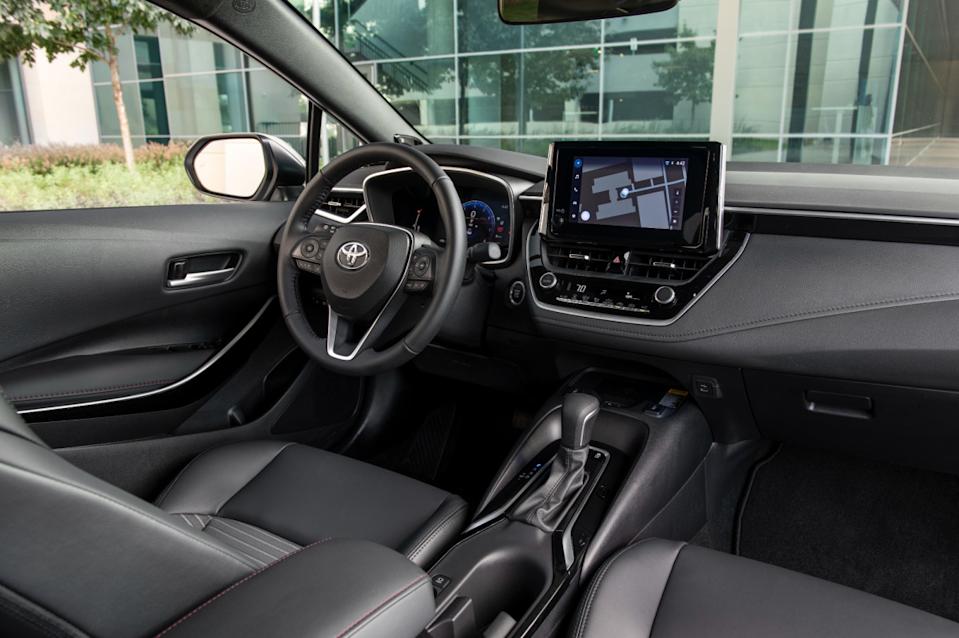 2025 Toyota Corolla XSEToyota
2025 Toyota Corolla XSEToyotaThe Corolla interior is not as well-executed as the Civic's. Disparate shapes about, and the thickness of the dash makes it feel less airy and open than the Civic. The material quality feels cheaper, and there's a preponderance of piano black plastic trim. The dashboard is simple and functional, but the physical controls are smaller and harder to use than the Civic's. Overall, the cabin is not quite as upscale or as cohesive as the Civic’s, and rear legroom in the Corolla sedan is significantly less (34.8 inches). Both vehicles offer solid seat comfort, but the Civic edges it with a more premium vibe.
Winner: Honda Civic
Infotainment and technology
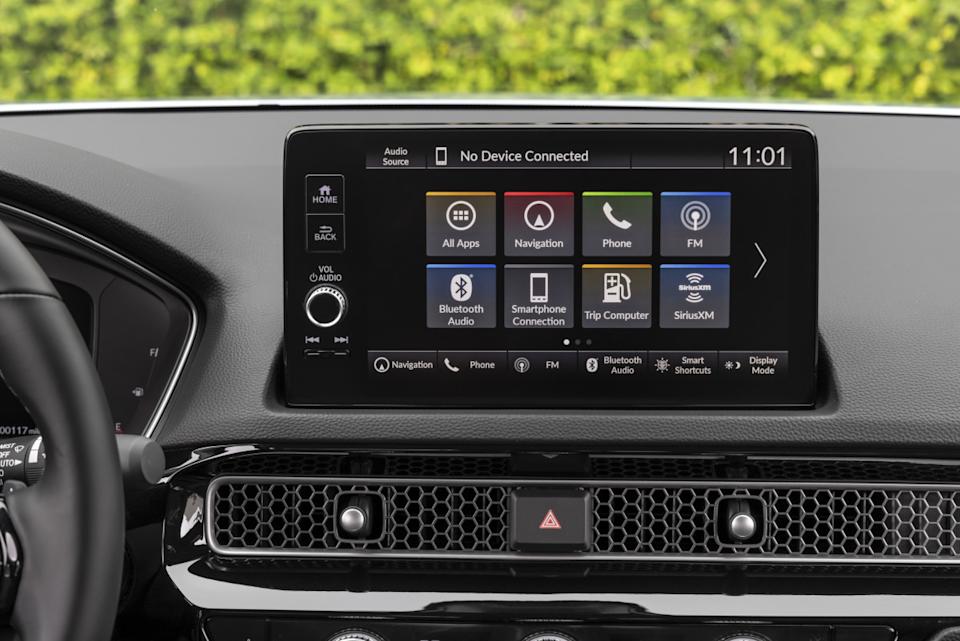 2022 Honda Civic Sedan TouringHonda
2022 Honda Civic Sedan TouringHondaNeither of the two compact cars will win any awards for their infotainment systems. They have improved but fall short of the system found in higher trims of the 2025 Hyundai Elantra. The 2025 Honda Civic offers two infotainment screen sizes: a standard 7-inch touchscreen and an optional 9-inch touchscreen available on higher trims, and comes with Google Built-In and wireless Apple CarPlay and Android Auto. Honda’s infotainment system in the 2025 Civic has been praised for its improved interface, quicker response times, and cleaner graphics. It also has an available Bose 12-speaker sound system.
2025 Toyota CorollaToyotaThe Corolla’s tech interface is also straightforward and reliable, with a newly updated Toyota Audio Multimedia system. It supports over-the-air updates and even offers voice activation through a new voice assistant feature. Visually, it's much better than the last system, and graphics are a notch above the Civic's. The screen size is a modest 8 inches for lower trims and a larger 10.5-inch version found in the new blacked-out FX, as well as in the XSE and XSE Hybrid trims. Oddly, the physical audio knob is nowhere to be found on trims with the larger screen. Higher Corolla trims can also be optioned out with a premium JBL audio system.
Winner: Tie
Safety and driver assistance
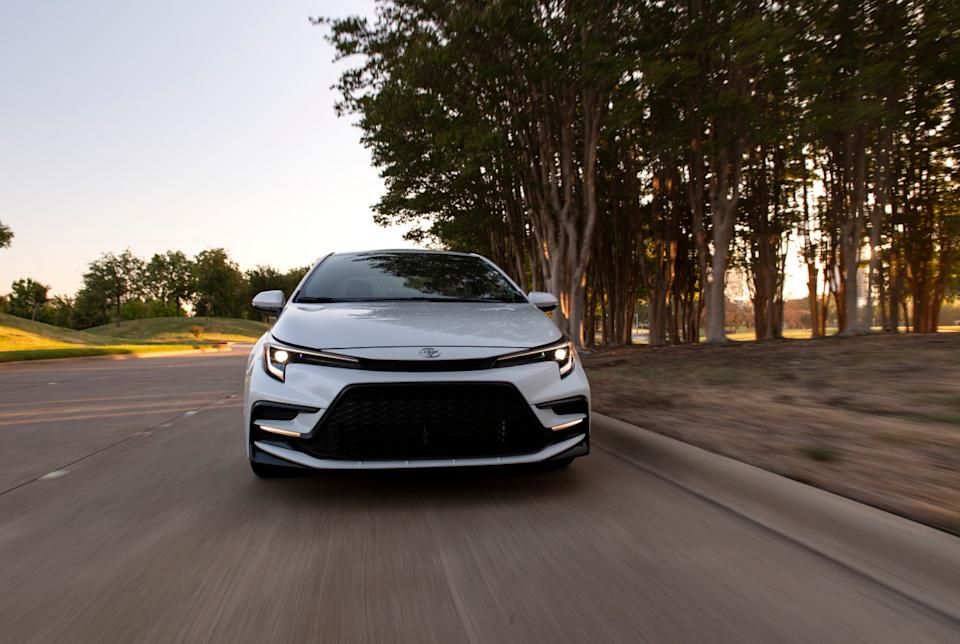 Toyota CorollaToyota
Toyota CorollaToyotaAny car buyer should have peace of mind driving either vehicle because both the Civic and Corolla score excellent marks for safety. Both of them also come equipped with excellent standard safety features. The 2025 Civic comes standard with Honda Sensing, which includes forward collision warning, lane-keeping assist, adaptive cruise control, and traffic sign recognition. The Corolla counters the Civic with Toyota Safety Sense 3.0, offering similar features like lane tracing assist, pre-collision system, and full-speed adaptive cruise control.
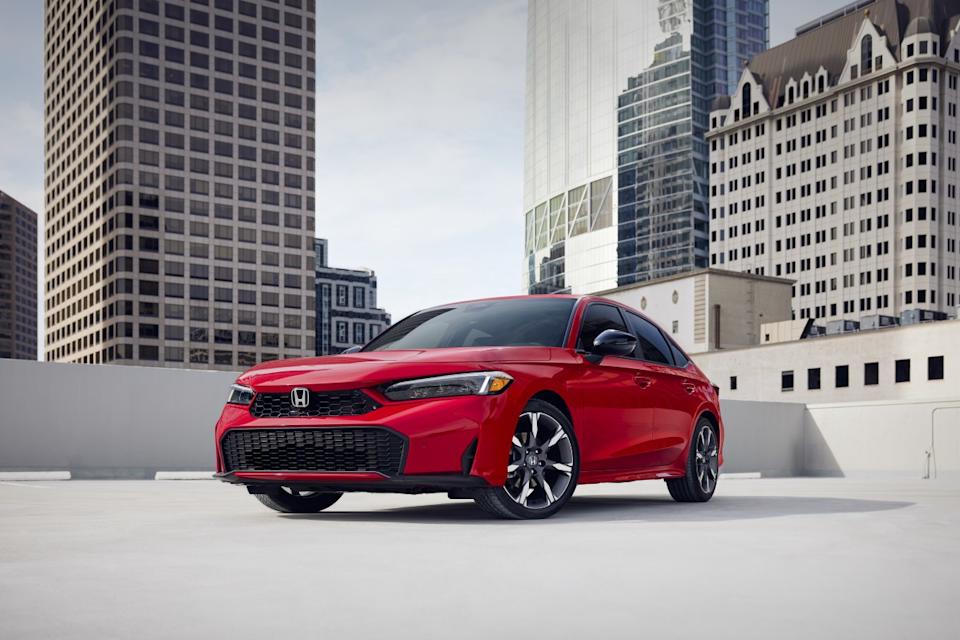 2025 Honda Civic SedanHonda
2025 Honda Civic SedanHondaIn crash testing, both cars received top scores from the IIHS and NHTSA, but the Corolla has the advantage by providing optional all-wheel drive on many trim levels, a feature the Civic doesn't offer at all. This means the Corolla should be the favorable choice when it comes to driving in snowy or wet weather, thanks to the added traction. We would call it a draw when it comes to safety, otherwise.
Winner: Toyota Corolla
Fuel economy
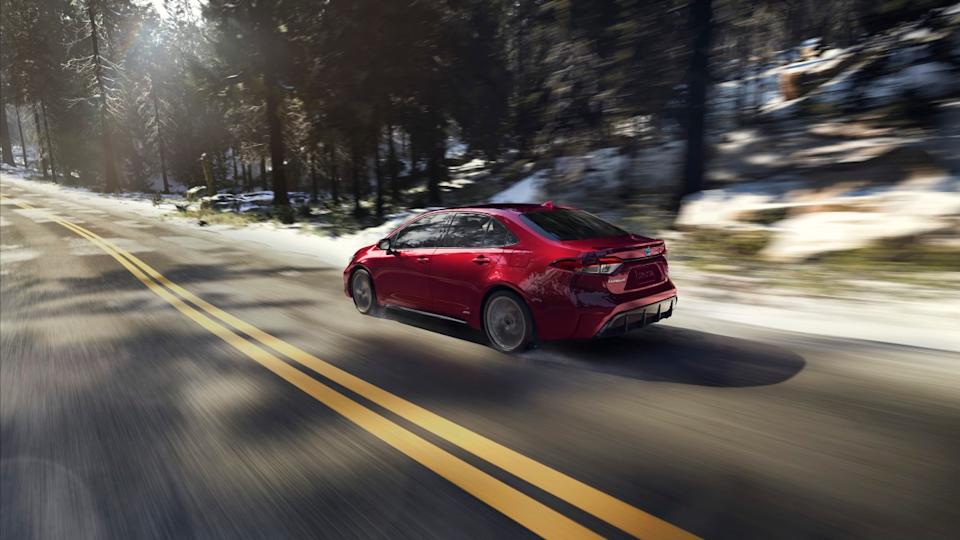 2025 Toyota CorollaToyota
2025 Toyota CorollaToyotaBoth cars are pretty miserly, even without the hybrid powertrain. Front-wheel drive gas versions of the Corolla sedan get up to 32 mpg city, 41 mpg highway, and 35 mpg combined. The Corolla Hybrid is a standout in the segment with its EPA-rated 50+ mpg combined, making it one of the most fuel-efficient non-plug-in vehicles you can buy. Selecting all-wheel drive in either gas or hybrid drops the efficiency a smidge, but the difference is negligible.
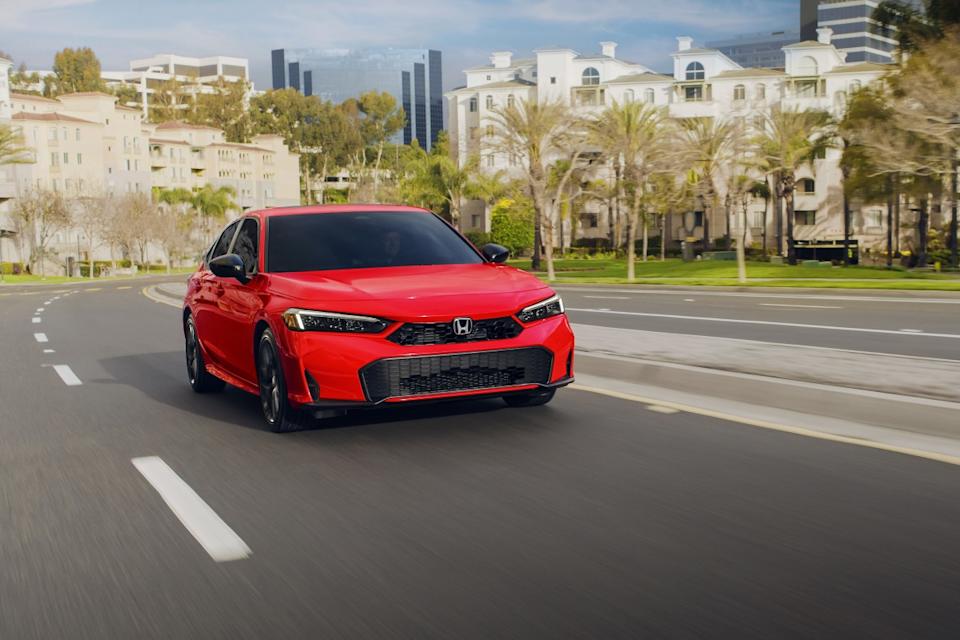 2025 Honda Civic Sedan Sport HybridHonda
2025 Honda Civic Sedan Sport HybridHonda Similar to the Corolla, the Honda Civic gets good numbers in both gas and hybrid variants: EPA estimates for the gas Civic (LX trim) are 32 mpg city, 41 mpg highway, and 36 mpg combined, a slight edge for the combined number. The Civic Hybrid sedan ratchets things up with 49 mpg combined, just a smidge shy of the Corolla Hybrid's numbers. It's pretty much a draw between both cars because of their impressive efficiency, and that much more the case with their miserly hybrid variants that will have you going to the pump far less frequently than you'd expect.
Winner: Tie
Pricing and value
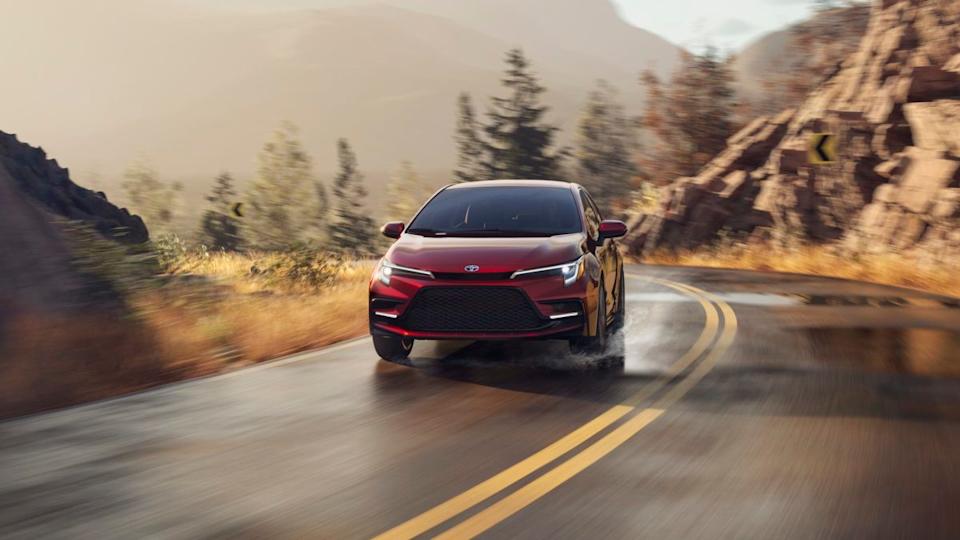 2025 Toyota Corolla HybridToyota
2025 Toyota Corolla HybridToyotaBoth models are affordable, even when you climb up the trim ladder. The base 2026 Civic LX has a starting price of $24,595. The top trim Civic Hatchback Hybrid starts at $30,495. The base Corolla LE costs $22,325, a couple of grand less than the base Civic. The top trim Corolla Hybrid XLE costs $28,190, a difference of $2,305. While the delta between the two base trims and the two top trims isn't a lot, the Corolla still wins the price matchup.
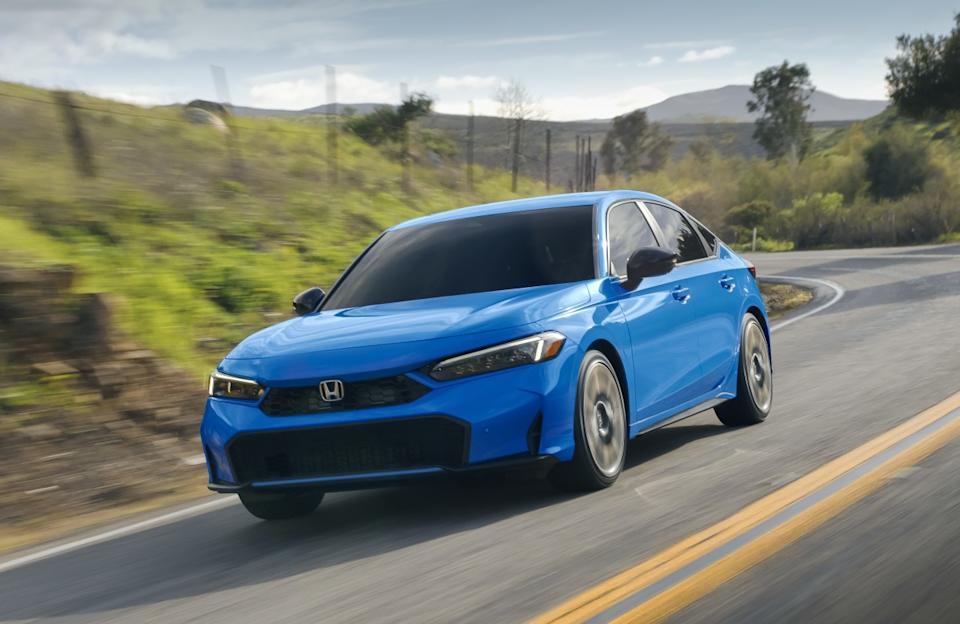 2025 Honda Civic Hatchback Sport Touring HybridHonda
2025 Honda Civic Hatchback Sport Touring HybridHondaValue is the harder category to decipher, as both cars pack in great standard features. The 2026 Honda Civic Sport (one level up from the base LX) comes with 18-inch gloss black alloy wheels, heated power side mirrors, LED headlights, cloth bucket seats, automatic climate control, a leather wrapped steering wheel, an 8-speaker audio system, Apple CarPlay/Android Auto (wired), push button start, and remote engine start.
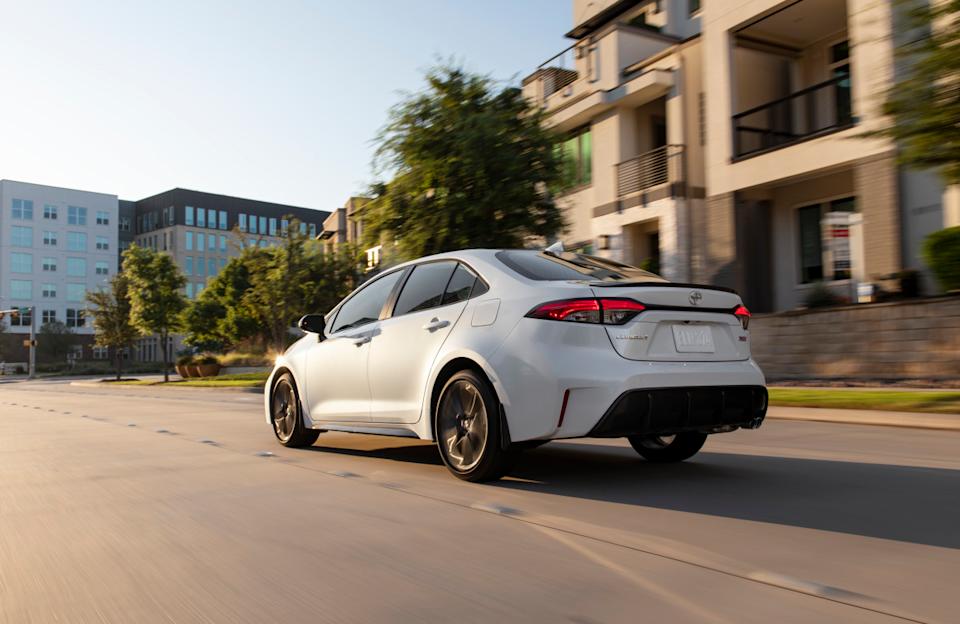 12th Generation Toyota CorollaToyota
12th Generation Toyota CorollaToyotaThe Corolla SE (one level up from the base LE) comes with 18-inch alloy wheels with machined accents, heated power outside mirrors, 6-way manually adjustable fabric upholstered sport seats, leather wrapped steering wheel, smart key system for doors and trunk, automatic climate control, remote keyless entry, LED lighting, a 6-speaker audio system, and wireless Apple CarPlay/Android Auto.
Toyota slightly edges out Honda in the Consumer Reports brand reliability study, taking the #3 and #4 spots, respectively. When it comes to initial quality, Honda handily wins in the J.D. Power study, taking the #6 spot over Toyota's #19 spot. The Civic edges out the Corolla when it comes to overall refinement and style. The Corolla wins on price. Reliability (long term) favors Toyota over Honda, while initial quality favors Honda over Toyota by a bigger margin.
Winner: Tie
Which one is better?
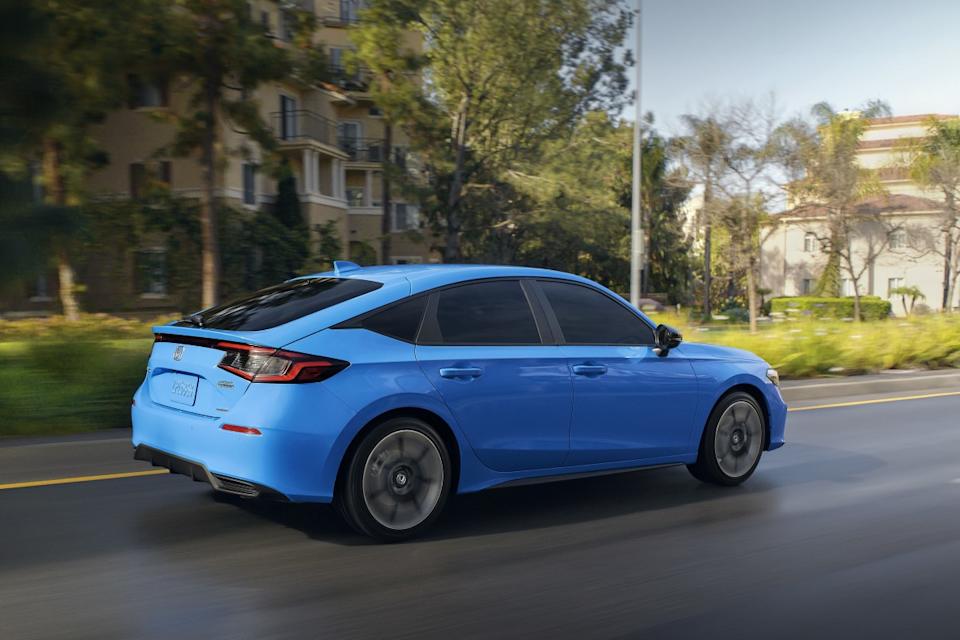 2025 Honda Civic Hatchback Sport Touring HybridHonda
2025 Honda Civic Hatchback Sport Touring HybridHonda Unsurprisingly, it's a very tight race between the two. It's a tie in many of the categories, but the Civic edges out the Corolla in three: Performance and Driving Dynamics, Exterior Styling, and Interior Styling and Comfort. The Corolla Hybrid model is a superstar when it comes to stretching a gallon of gas, but the Civic Hybrid isn't far behind. There's no clear winner there. The Corolla narrowly wins the safety category with its optional all-wheel drive, but if you value sharper design, more engaging driving dynamics, and a better interior, the Honda Civic comes out on top. It’s the more enjoyable car to drive, live with, and even show off a little.
Overall Winner: Honda Civic
Final thoughts
This battle's narrow victory by the Civic just goes to show you how much Honda and Toyota are packing into their affordable cars. Not only are they the best they've ever been, but they also score well in major categories that buyers care about. The Civic narrowly takes the win thanks to its superior driving feel, upscale interior, and great exterior styling, but it's not a slam dunk overall. Both models are dependable, comfortable, attractive, and safe. No matter which one you choose, you will come out a winner.
The Honda Civic and Toyota Corolla are Bitter Rivals. Which One is Better? first appeared on Autoblog on Jul 17, 2025
This story was originally reported by Autoblog on Jul 17, 2025, where it first appeared.














